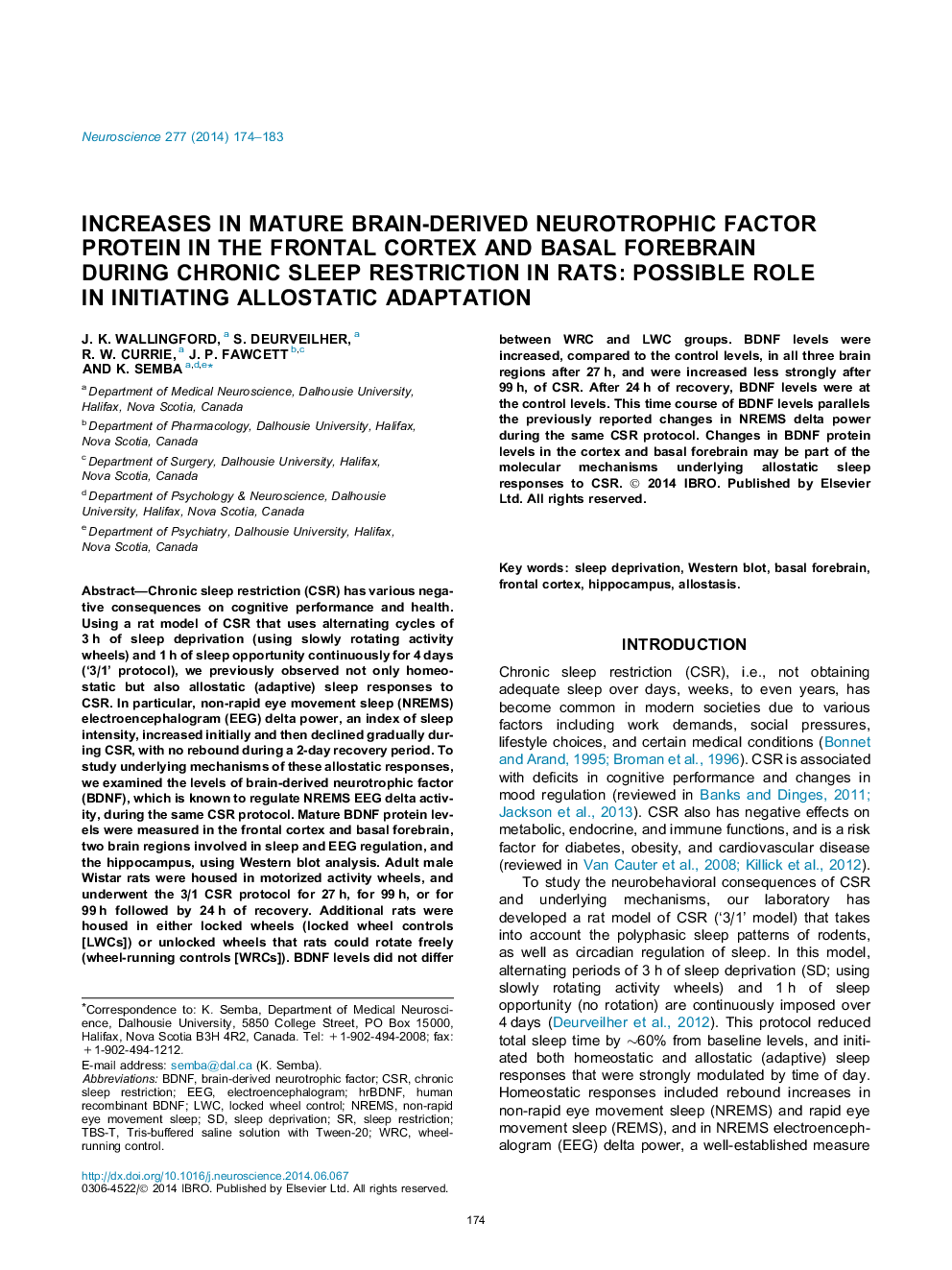| کد مقاله | کد نشریه | سال انتشار | مقاله انگلیسی | نسخه تمام متن |
|---|---|---|---|---|
| 6273590 | 1614799 | 2014 | 10 صفحه PDF | دانلود رایگان |
عنوان انگلیسی مقاله ISI
Increases in mature brain-derived neurotrophic factor protein in the frontal cortex and basal forebrain during chronic sleep restriction in rats: Possible role in initiating allostatic adaptation
ترجمه فارسی عنوان
افزایش در پروتئین فاکتور نوروتروفی فاقد مغز در قشر جلویی و مغز پیشانی در هنگام محدودیت خواب مزمن در موش صحرایی: نقش احتمالی در شروع سازگاری آلووستیک
دانلود مقاله + سفارش ترجمه
دانلود مقاله ISI انگلیسی
رایگان برای ایرانیان
کلمات کلیدی
CSRAllostasisNREMSTBS-TWRCLWCBDNF - BDNF یا فاکتور نورونزایی مشتقشده از مغز Electroencephalogram - الکتروانسفالوگرافیNon-rapid eye movement sleep - حرکت سریع چشم بدون خوابBrain-derived neurotrophic factor - فاکتور نوروتروفی مشتق شده از مغزfrontal cortex - قشر جلوییsleep restriction - محدودیت خوابchronic sleep restriction - محدودیت خواب مزمنSleep deprivation - محرومیت از خوابEEG - نوار مغزیHippocampus - هیپوکامپ Western blot - وسترن بلاتbasal forebrain - پیشانی پایه
موضوعات مرتبط
علوم زیستی و بیوفناوری
علم عصب شناسی
علوم اعصاب (عمومی)
چکیده انگلیسی
Chronic sleep restriction (CSR) has various negative consequences on cognitive performance and health. Using a rat model of CSR that uses alternating cycles of 3Â h of sleep deprivation (using slowly rotating activity wheels) and 1Â h of sleep opportunity continuously for 4Â days ('3/1' protocol), we previously observed not only homeostatic but also allostatic (adaptive) sleep responses to CSR. In particular, non-rapid eye movement sleep (NREMS) electroencephalogram (EEG) delta power, an index of sleep intensity, increased initially and then declined gradually during CSR, with no rebound during a 2-day recovery period. To study underlying mechanisms of these allostatic responses, we examined the levels of brain-derived neurotrophic factor (BDNF), which is known to regulate NREMS EEG delta activity, during the same CSR protocol. Mature BDNF protein levels were measured in the frontal cortex and basal forebrain, two brain regions involved in sleep and EEG regulation, and the hippocampus, using Western blot analysis. Adult male Wistar rats were housed in motorized activity wheels, and underwent the 3/1 CSR protocol for 27Â h, for 99Â h, or for 99Â h followed by 24Â h of recovery. Additional rats were housed in either locked wheels (locked wheel controls [LWCs]) or unlocked wheels that rats could rotate freely (wheel-running controls [WRCs]). BDNF levels did not differ between WRC and LWC groups. BDNF levels were increased, compared to the control levels, in all three brain regions after 27Â h, and were increased less strongly after 99Â h, of CSR. After 24Â h of recovery, BDNF levels were at the control levels. This time course of BDNF levels parallels the previously reported changes in NREMS delta power during the same CSR protocol. Changes in BDNF protein levels in the cortex and basal forebrain may be part of the molecular mechanisms underlying allostatic sleep responses to CSR.
ناشر
Database: Elsevier - ScienceDirect (ساینس دایرکت)
Journal: Neuroscience - Volume 277, 26 September 2014, Pages 174-183
Journal: Neuroscience - Volume 277, 26 September 2014, Pages 174-183
نویسندگان
J.K. Wallingford, S. Deurveilher, R.W. Currie, J.P. Fawcett, K. Semba,
